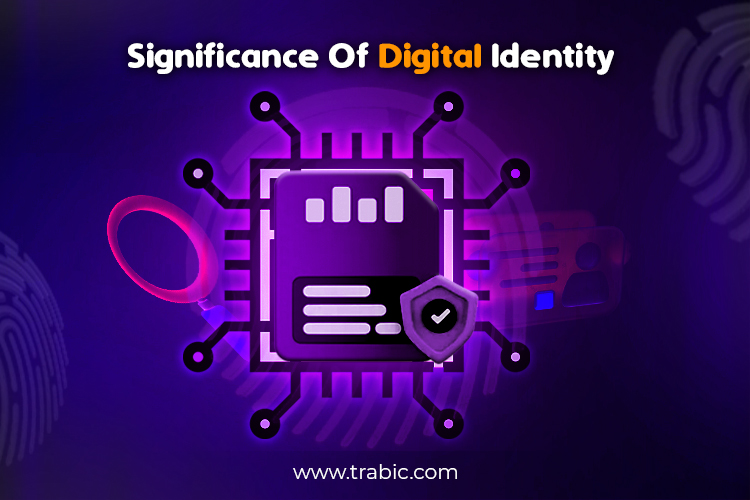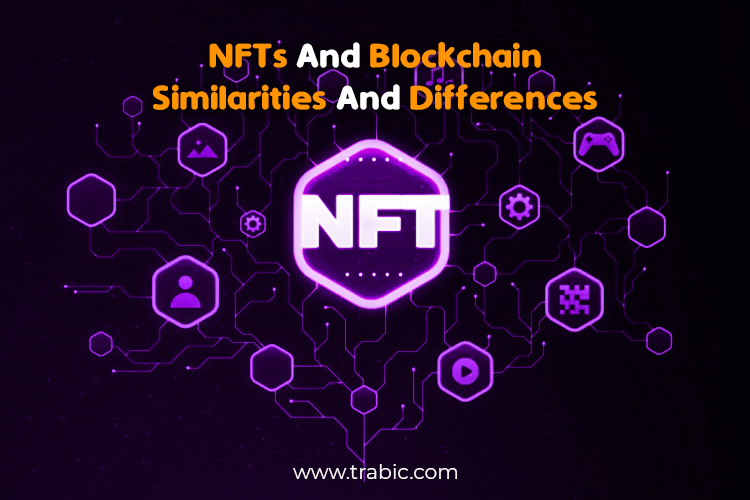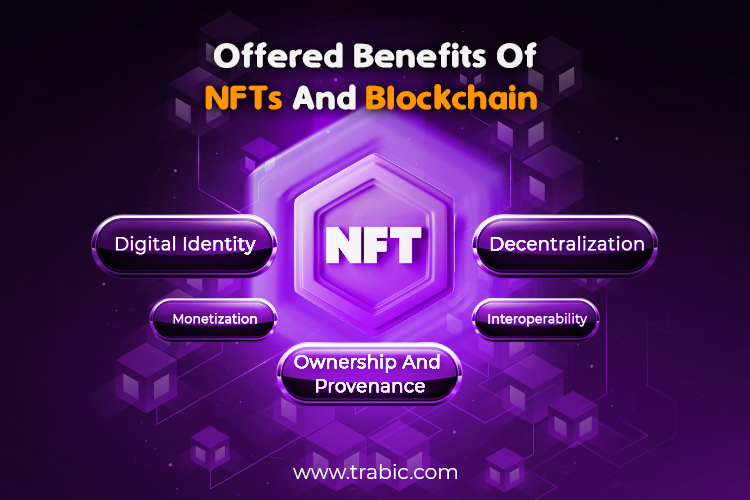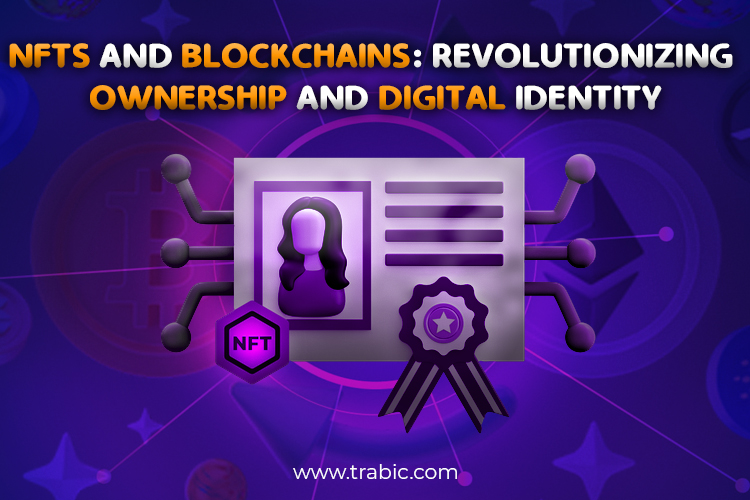NFTs and blockchains are revolutionizing ownership and digital identity by providing a secure and decentralized system for managing and verifying ownership of digital assets. NFTs, non-fungible tokens, are distinctive digital assets stored on a decentralized, immutable blockchain. The blockchain provides a secure and transparent system for recording ownership of these assets, and smart contracts allow for automated and trustless transactions.
One of the main benefits of Non-fungible tokens and blockchains is that they provide a way to prove ownership and authenticity of digital assets. Before NFTs and blockchains, digital assets such as images, videos, and music could be easily duplicated or distributed without permission, making it difficult for creators to control and monetize their work.
Non-fungible tokens unravel this situation by creating a unique, verifiable record of ownership stored on a blockchain. This means that creators can prove they are the asset’s original owner and control how it is used and distributed. NFTs are also revolutionizing digital identity by allowing individuals to create and manage their digital identity on the blockchain.
By creating an NFT representing their identity, individuals can control how their data is shared and used online and have a secure and decentralized record of their online activity. Furthermore, Non-fungible tokens and blockchains are changing how people think about ownership and value.
In traditional systems, ownership and value are often tied to physical assets, such as property or stocks. However, NFTs and blockchains allow the creation and ownership of unique digital assets, which can have significant value in their own right. This has led to new markets for digital assets, such as digital art and collectibles, which can be bought and sold using cryptocurrency.
NFTs and blockchains are revolutionizing ownership and digital identity by providing a secure and decentralized system for managing and verifying ownership of digital assets, creating new markets for digital assets, and changing how people think about ownership and value.
What & Why Is Digital Identity Significant?

Digital identity is termed as the online representation of a person or entity composed of personal and professional data that identifies and describes them in the digital world. It includes usernames, email addresses, passwords, social media profiles, payment information, and other personally identifiable information (PII). Digital identity is crucial because it is used to authenticate and verify the identity of individuals, which is critical for access to digital services and platforms. It enables individuals to establish trust with businesses, governments, and other organizations they interact with online. Digital identity also allows for secure and convenient online transactions, such as online shopping or banking, and helps protect against identity theft and fraud.
As more activities move online, from shopping to socializing to work, a secure and reliable digital identity becomes increasingly important. Additionally, the rise of blockchain technology has the potential to revolutionize digital identity by enabling individuals to own and control their identity data rather than relying on centralized authorities to manage it.
Digital identity is closely related to NFTs and blockchain technology. Blockchain-based NFTs offer a unique digital identity to each asset, enabling a secure and tamper-proof record of ownership and authenticity. In the case of digital art, for example, the NFT assists as a unique identifier for a specific artwork, allowing the owner to prove ownership and authenticity. This digital identity also allows for the tracking of provenance, which can help increase the value of the artwork over time.
In addition to NFTs, blockchain technology can create decentralized digital identity solutions that are more secure and user-controlled than traditional identity systems. These decentralized digital identities can be used for various purposes, such as accessing online services, proving age or identity, and enabling secure and private transactions. Blockchain and NFTs can help individuals and organizations establish and maintain secure and trustworthy digital identities, providing greater control and ownership over their digital assets and data.
Analyzing Similarities And Differences Between NFTs And Blockchain

NFTs and blockchain are similar in that NFTs are often created and traded on blockchain networks. A blockchain is a distributed digital ledger responsible for recording all transactions securely and transparently, while an NFT is a unique digital asset verified on a blockchain. Both NFTs and blockchains are decentralized, meaning a central authority or intermediary does not control them. Instead, they rely on a network of users to verify and process transactions. Additionally, both NFTs and blockchain have the potential to revolutionize ownership and digital identity and enable new forms of monetization and value transfer in the digital world.
NFTs and blockchains are different in their specific functions and characteristics. Blockchain is a distributed digital ledger that documents transactions safely and transparently. It is designed to facilitate the secure transfer of digital assets, such as cryptocurrencies or other data, without a central authority or intermediary. On the other hand, NFTs are unique digital assets that are verified on a blockchain. They can represent digital content, such as art, music, videos, and more. NFTs use blockchain technology to ensure their authenticity, ownership, and provenance. One key difference is that blockchain technology can be used for various applications beyond NFTs, such as decentralized finance (DeFi), supply chain management, etc.
NFTs, on the other hand, are a specific application of blockchain technology that focuses on unique digital assets. Another difference is that while blockchain technology is designed to be decentralized, NFTs can be created and traded on centralized and decentralized platforms. Centralized platforms, such as major online marketplaces, can offer more user-friendly interfaces and accessibility for creators and buyers, while decentralized platforms offer users more control, security, and transparency. While NFTs and blockchain share some similarities, they serve different functions and have different characteristics that make them distinct.
What Benefits Do NFTs And Blockchain Have To Offer?
Non-fungible tokens and blockchains can revolutionize ownership and digital identity, create new business models and revenue streams, and empower individuals with greater control over their digital lives. There are several benefits of NFTs (non-fungible tokens) and blockchains.

Ownership And Provenance
Have you ever wondered who owns a piece of art or a collectible item? Or you may have questioned the authenticity of a rare item and its provenance. In today’s digital age, these questions extend beyond physical objects to include digital assets such as images, videos, and music. Enter NFTs and blockchain technology, which offer unique solutions to issues of ownership and provenance. By leveraging blockchain’s immutable and transparent nature, Non-fungible tokens provide a way to verify the ownership and authenticity of digital assets.
NFTs can be utilized to prove ownership and genuineness of digital assets, such as art, music, and collectibles. Blockchains provide a tamper-proof and transparent record of ownership and transaction history, ensuring that the asset is unique and can be traced back to the original creator. Ownership and provenance are vital benefits of NFTs (non-fungible tokens) and blockchains.
Non-fungible tokens allow the creation of unique digital assets that can be easily verified and authenticated on a blockchain. This means that NFTs can be used to prove ownership and authenticity of digital assets, such as art, music, and collectibles. Blockchains provide a tamper-proof and transparent record of ownership and transaction history, ensuring that the asset is unique and can be traced back to the original creator. This provides a level of security and transparency that is impossible with traditional ownership models.
For instance, in the art world, NFTs can be utilized to verify the authenticity and ownership of digital art, which can be easily replicated and shared online. With NFTs, artists can create one-of-a-kind digital art pieces and sell them to collectors on blockchain-based marketplaces. The ownership of the digital art is then recorded on the blockchain, providing a tamper-proof and transparent record of ownership.
Similarly, in the music industry, NFTs can be used to verify ownership and royalty payments for digital music assets. By using blockchain-based smart contracts, musicians can confirm that they earn proper compensation for their work and that their music is properly licensed and used. Ownership and provenance are significant benefits of NFTs and blockchain technology. It enables creators to prove the authenticity and ownership of their digital assets and provides a new level of transparency and security for the ownership and transfer of digital assets.
Decentralization
Decentralization is a key benefit that Non-fungible tokens and blockchain technology offer. By leveraging decentralized networks, NFTs allow for creating and exchanging unique digital assets without intermediaries like banks or marketplaces. This eliminates the risk of central points of failure and censorship, making transactions more secure and transparent. Additionally, decentralization gives artists and creators more control over their work, as they can sell their assets directly to buyers without going through third-party platforms. NFTs and blockchain technology can revolutionize how we perceive digital ownership and value, enabling a new era of decentralized creativity and commerce.
NFTs and blockchains are decentralized, meaning any single entity or authority does not control them. This authorizes for more significant security, transparency, and immutability of data. Decentralization is another critical benefit of NFTs (non-fungible tokens) and blockchains. Traditional ownership and control models rely on centralized entities, such as governments, corporations, or financial institutions, to validate and manage transactions. This creates a single point of failure and introduces the risk of fraud, corruption, or censorship.
NFTs and blockchains, on the other hand, are decentralized, meaning that transactions are verified and recorded by a network of users rather than a single authority. This eliminates the need for intermediaries and creates a more trustless and democratic system. Decentralization also enables greater privacy and security for users, as a centralized entity does not control or monitor their data and transactions. This can be especially important for individuals in countries with oppressive regimes or those wishing to protect their personal information and online activity.
Moreover, decentralization can foster innovation and experimentation, as it allows for the creation of new types of applications and services that are impossible under centralized models. Decentralized finance (DeFi) is a prime example, as it enables individuals to participate in financial transactions and earn rewards without relying on traditional financial institutions. Decentralization is a significant benefit of NFTs and blockchain technology, as it creates a more trustless and democratic system, enhances privacy and security for users, and fosters innovation and experimentation.
Interoperability
Interoperability is a critical concept in blockchain and NFTs, referring to the ability of different systems to communicate and exchange data seamlessly. With NFTs, interoperability means that these digital assets can be transferred and traded across different blockchains, creating a more connected and accessible ecosystem for creators and collectors alike.
By leveraging the power of blockchain technology, NFTs can offer a range of benefits, including increased security, transparency, and immutability. Furthermore, interoperability enables NFTs to be used across various industries, from gaming to art to finance, creating new opportunities for innovation and collaboration. Ultimately, the interoperability of NFTs and blockchains is a critical factor in these exciting technologies’ growing popularity and potential.
NFTs and blockchains can be used across different platforms and ecosystems, allowing for greater interoperability and flexibility in how digital assets are used and traded. Interoperability is another benefit that NFTs (non-fungible tokens) and blockchains offer. Interoperability directs to the knowledge of various systems, networks, or applications to communicate and exchange information seamlessly.
In NFTs and blockchains, interoperability means that NFTs can be transferred across different blockchain networks. Different applications and platforms can access and verify the information associated with them. This means that NFTs can be used across different applications and platforms, allowing for greater flexibility and utility. For example, an NFT created on one blockchain network can be transferred to another and retain its unique identity and ownership information. This interoperability also allows for more complex applications and systems that can leverage the benefits of multiple blockchain networks and platforms.
Additionally, interoperability enables the creation of decentralized exchanges and marketplaces where NFTs can be bought, sold, and traded across different blockchain networks and platforms. This creates a more liquid market for NFTs and can increase their value and utility. Interoperability is a crucial benefit of NFTs and blockchains, as it allows for greater flexibility, utility, and value of digital assets.
Monetization
The monetization of NFTs and blockchain offers many benefits for creators, collectors, and investors. Firstly, NFTs provide a new way to monetize digital content such as art, music, and videos, allowing creators to sell their work directly to their fans and collectors. This eliminates the need for intermediaries and enables creators to earn more revenue while retaining control over their intellectual property.
Furthermore, blockchain technology offers a transparent and secure way to track ownership and transactions, reducing the risk of fraud and enabling investors to trade NFTs with confidence. This also opens up new opportunities for fractional ownership and secondary market sales, providing additional revenue streams for creators and investors.
Overall, monetizing NFTs and blockchain can revolutionize the creative economy by providing a more equitable and transparent way to monetize digital content. As the technology evolves continuously, we anticipate seeing even more revolutionary use cases and revenue streams emerging.
NFTs allow creators and owners to monetize their digital assets, which can be bought, sold, and traded on blockchain-based marketplaces. This creates new revenue streams and business models for creators and enables more excellent value derived from digital assets. Monetization is another crucial benefit that NFTs and blockchain technology offer. Non-fungible tokens enable creators and artists to monetize their digital content in a new and unique way.
Creating a one-of-a-kind digital asset through an NFT allows creators to sell their content and retain ownership while still receiving payment from buyers. This is a significant change from the traditional model of digital content ownership, where creators often have to give up control and ownership of their content in exchange for payment. Additionally, blockchain technology allows for new forms of monetization, such as micropayments and revenue sharing.
Using smart contracts and cryptocurrencies, creators can receive small payments for their content from users in real time, without intermediaries such as banks or payment processors. This can be especially beneficial for creators with smaller audiences who may need access to traditional monetization methods.
Furthermore, Non-fungible tokens and blockchain technology enable creators to set rules and conditions for how their content can be used and distributed, allowing them to receive ongoing revenue from their content even after it has been sold. For example, a musician could create an NFT for a song and set a rule that a small payment is automatically sent to the creator’s wallet every time the song is played or streamed. The monetization potential of NFTs and blockchain technology offers new opportunities for creators to profit from their digital content and retain ownership and control over their work.
Digital Identity
Non-fungible tokens can also represent digital identity, allowing for greater privacy and control over personal data. With blockchains, users can have greater control over their data and identity, as they can choose what information is shared and with whom. One of the benefits that NFTs and blockchain offer is the ability to establish and maintain a digital identity.
With traditional online platforms, it can be challenging to prove who you are or to maintain control over your online persona. However, with blockchain-based digital identity systems, individuals can create a secure and verifiable online identity they own and control. This can be particularly valuable when trust is essential, such as in online marketplaces or social media networks.
By leveraging blockchain technology, individuals can prove their identity, track their reputation, and establish a more secure and trustworthy online presence. This can also be useful when there is a need for more privacy or anonymity, as blockchain-based systems can allow individuals to maintain control over their personal information and data. Establishing a digital identity through blockchain technology and Non-fungible tokens can provide greater security, privacy, and control over one’s online presence, increasing trust and engagement in digital spaces.
